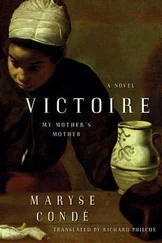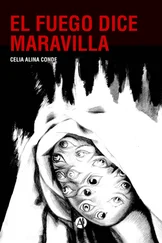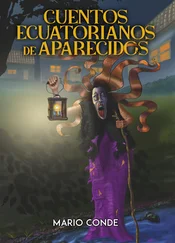While Wole had been speaking, the moon had made its appearance and was rubbing its round cheek against the branches of the candlewood trees. Amarante knew full well this was just a tale for young girls so that they didn’t run off with a husband of their own choosing. Yet it moved her to tears. She ran her hand over Wole, who placed it firmly in the right place.
Wole had attended the local elementary school in Basse-Terre and had been expelled for insubordination. He was now getting his revenge. Every morning he gathered the children around him and incited them to hate white folks who had led the ancestors into captivity and shipped them to Guadeloupe to slave in the cane fields. Although she appreciated the strength and force of this unexpected companion, who was a balm to her humiliated heart and body, Amarante thought these lessons narrowed the mind. Humans need more than just memories of yesterday and yesteryears. They need hope, poetry, and music! Her mother had naturally taught her old Wayana songs, but Amarante didn’t stop there. She remembered how Celanire had initiated her in other music. It wasn’t long before the natural cathedral of the woods echoed with children’s voices exuberantly singing the Regina Coeli and the Exultate, Jubilate . Even though Wole did not really like Mozart, the motets were so beautiful, he did not dare protest.
Soon, however, Amarante desired something more. She was no longer content with sounds collected by others. She asked those going down to the town to buy her exercise books, pencils, rulers, and erasers, and she began to compose. Up before dawn, lying on her stomach on the carpet of green, it was as if her past suffering and the discontent of her heart and body flowed out of her and changed into this precious, magical stream of sounds. She spent days on end like that forgetting to eat or drink. She no longer needed anything or anyone.
She was free. She had been healed.
Meanwhile, deprived of a wife who had always been beyond reproach, Matthieu suffered martyrdom. A slow degeneration set in. First of all he was seen downing glass after glass in the rum shops, where men of his standing wouldn’t be seen dead. Then he stumbled along the seafront at ungodly hours. His clothes became filthy. He discarded his frock coat and jacket for a shirt and twill trousers. He began to stink of sweat. His hair remained uncombed. His superiors sharply rebuked him for not taking it like a man. How could he lose face over a woman! They would have turned a blind eye if he hadn’t cornered anyone and everyone to churn out his spiel. He swore he could sense Celanire’s true identity. His mistake during all these years was having believed there were two children, whereas it was one and the same baby. Celanire was Pisket’s child. Don’t ask for any proof! He didn’t have any! And he never would. In this sort of investigation, instinct was convincing enough. He had arrived at his conclusion by supposition, deduction, and sneezing, and nothing would make him think otherwise. His stunned listeners endeavored in vain to get him to see reason. Imagine if such stories reached the ears of the governor, Thomas de Brabant! And if he heard that his beloved wife was the daughter of an unknown father and a bòbò! Nothing good could come out of angering someone with connections high up. But Matthieu continued to do exactly as he pleased. He wrote letter after letter to the Ministry of the Colonies, the Ministry of the Interior, and the Ministry for Public Safety. He swamped the papers in France, Guadeloupe, and Martinique with open letters that never got published. Drastic measures had to be taken. He was retrograded to watchdog, stationed outside the schools. Unfortunately, he insisted on recounting his tribulations to the dumbfounded teachers and pupils. Then he mobilized his socialist colleagues at La Pointe. Always prepared to back the wrong horse, they went to a lot of trouble inquiring why this superior mind was being picked on.
They then had the idea of transferring him to Grande-Anse. There he could discreetly continue his investigation.
Matthieu arrived then in Grande-Anse at the height of the dry season. The heat was suffocating. The sea and the sky boiled in sulfur. The flowers of the hart’s tongue clinging to the slopes of the hills were scorched by the sun. He no longer recognized the place he had grown up in. Everything had been freshly daubed and painted. Under the influence of an invasion of rosy-cheeked Mormons from Salt Lake City, the bordellos had been transformed into respectable houses. The turpitudes of the Ginger Moon had slipped its memory, and it now housed a harmless mom-and-pop store on the ground floor. The Saint-Jean-Bosco orphanage had been turned into a college for whites, mulattos, and blacks. The seafront had been planted with royal palms and made into a promenade where families could take the air. Yet despite all these modern touches Matthieu could see that the people remained the same. Acquainted with the purpose of his visit to Grande-Anse, everyone wanted to help him. With the passing of time the memory of Ofusan was revered like that of a saint. Almost twenty years later they still lamented the fate of good Dr. Pinceau. If they could, they would do everything possible to help him reveal the identity of “darling little Celanire,” who without a doubt had caused the couple’s misfortune. But they didn’t have the slightest clue. No sooner had he moved in than Matthieu set to work. There was no doubt in his mind. Since he believed Celanire to be Pisket’s child, the first thing to do was to go back over her tracks. Here was a girl who was probably born in Grande-Anse, had grown up there, died, and was buried there, and yet nobody knew a thing about her. How come there was not a single friend to flower her grave? Not a single enemy to badmouth her? He focused his investigation on the Ginger Moon. Alas, however much he prowled around the upstairs-downstairs house, which could have come straight out of the French Quarter in New Orleans, he came up with nothing. The former owner, Carmen, had turned to religion before being called to God. As for the former residents, who had now settled down and had their own pew at church, it would be unwise to recall the time when they were bòbòs . Matthieu did not give up hope, convinced that finally he would get lucky. He took his meals in a cheap eating house inappropriately named the Delights of Gargantua.
One evening when he was about to rinse out the bad taste of codfish and rice with some white rum, the owner informed him that her mother would like a word with him. Under her cottony white hair combed into four buns, she must have been in her sixties. Everyone dutifully called her Mama Sidoine after the name of her late husband, a respected fisherman.
“In actual fact, my real name is Madone,” she said in a mysterious tone of voice.
As this did not seem to mean anything to Matthieu, she had to refresh his memory.
“Pisket’s good friend, the only one she ever had. She came back to die in my arms, that’s proof enough! Two people loved her on this earth. Me and her twin, Kung Fui.”
Matthieu lowered his voice and went straight to the point.
“Do you know the name of the child’s father?”
“Do I know it? Of course I do!”
She lowered her voice as well.
“It’s Dr. Jean Pinceau!”
Matthieu leaped to his feet, drew himself up to his full height, and shouted furiously, “ À pa vwé! Manti aw! Manti aw! It’s not true! You’re lying!”
She eyed him scornfully.
“What’s got into you to shout like that! You really think some men are different from the rest? The best of them are not worth the rope to hang them with. All of them are scumbags. In fact few people know that Dr. Jean Pinceau was stinking rotten to the core. Everyone in Grande-Anse respected and worshipped him like the Holy Sacrament, whereas he liked the ladies of the night and was a regular visitor to the bordellos! At the Ginger Moon his favorite was Pisket, the dirtiest slut of them all.”
Читать дальше












